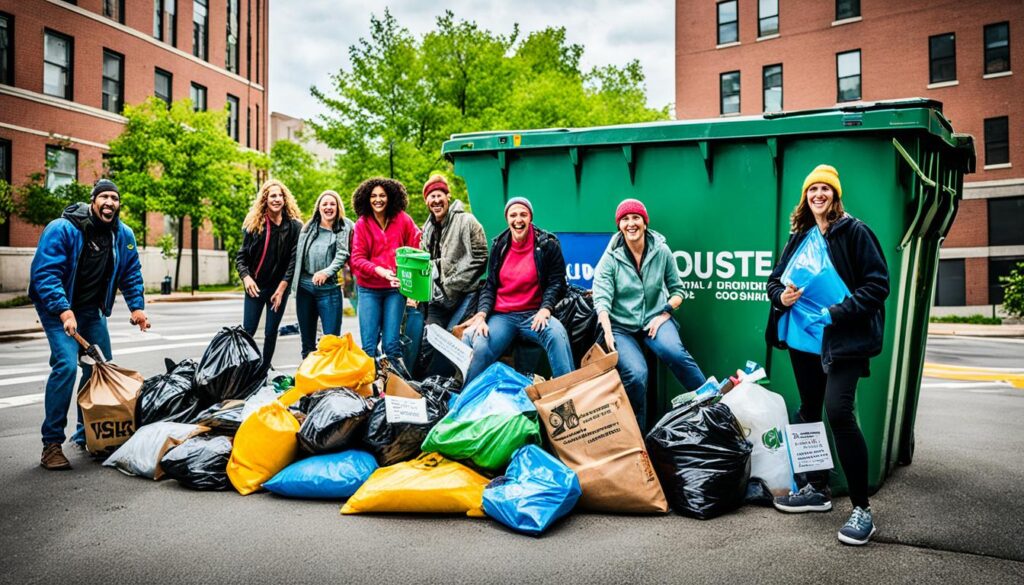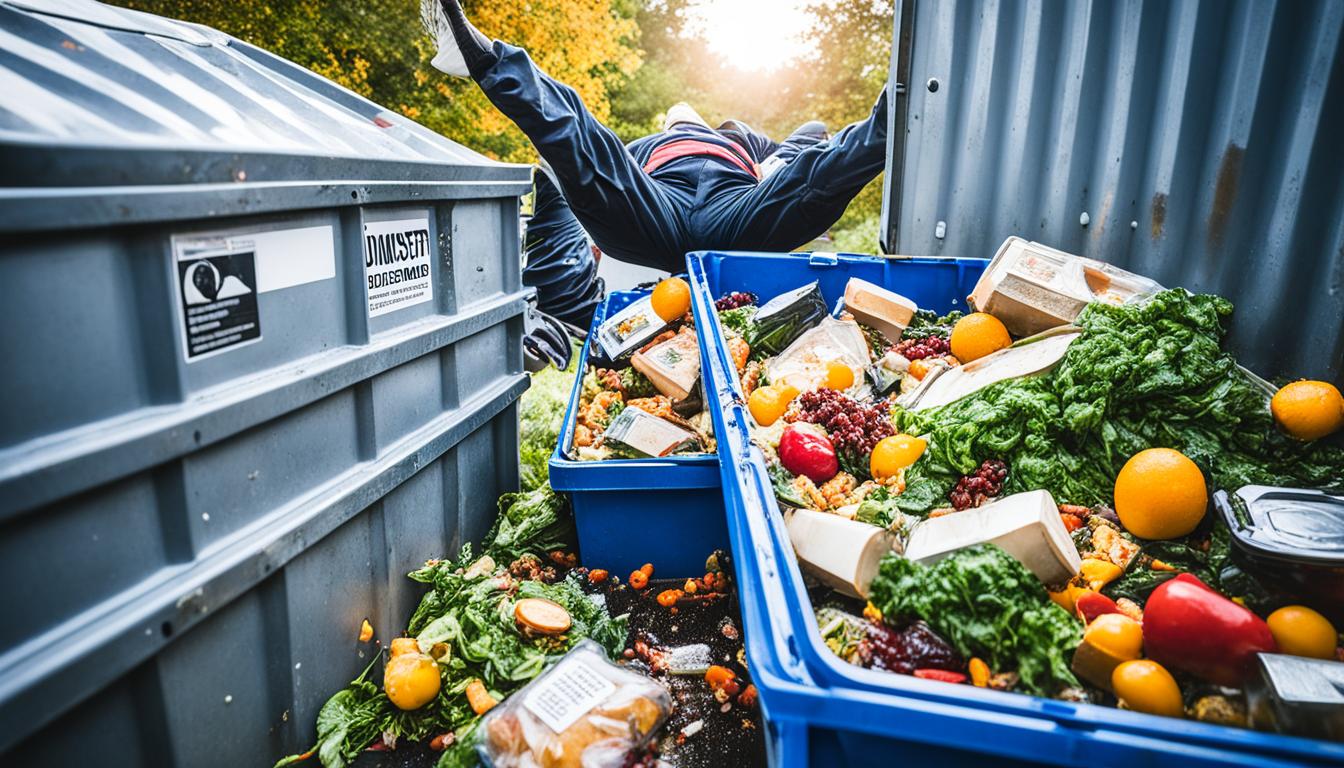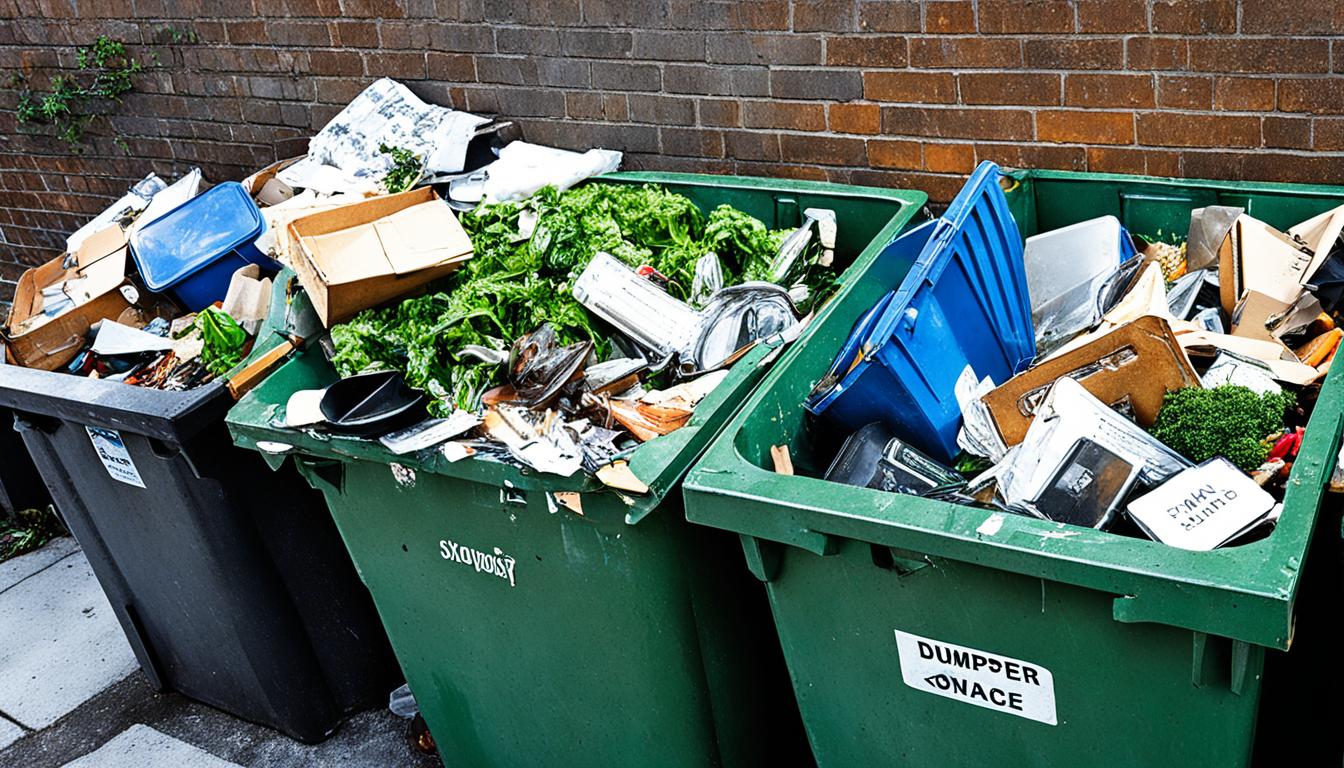Disclosure: This Post Contains Affiliate Links; We earn a commission on purchases.
Welcome to the world of dumpster diving, where unconventional actions create waves of change. Dumpster diving is a form of environmental activism that aims to tackle issues of food waste, sustainability, and consumerism. By diving into dumpsters behind grocery stores, individuals can uncover perfectly good food that would otherwise go to waste. This practice not only helps to address the pressing issue of hunger but also promotes sustainable consumption by reducing food waste.
Dumpster diving challenges societal norms and aims to inspire grocery stores to donate their excess food instead of discarding it. It sheds light on the staggering amount of food that is wasted in the United States and highlights the environmental impact of such wastefulness. Furthermore, dumpster diving advocates aspire to overcome social stigmas and personal ego to create a powerful statement against consumerism and environmental injustice.
So join the dumpster diving movement and become an environmental activist, raising awareness through action. Together, we can make a difference and contribute to a more sustainable future.
Key Takeaways:
- Dumpster diving is an unconventional form of environmental activism that addresses food waste, sustainability, and consumerism.
- By diving into dumpsters behind grocery stores, individuals are able to find perfectly good food that would otherwise go to waste, thus reducing food waste and addressing the issue of hunger.
- Dumpster diving challenges societal norms and encourages grocery stores to donate their excess food instead of discarding it.
- Engaging in dumpster diving is a powerful statement against consumerism and environmental injustice.
- By joining the dumpster diving movement, individuals can become environmental activists and contribute to a more sustainable future.
The Impact of Food Waste in the United States
In the United States, food waste is a significant problem with far-reaching consequences. Shockingly, nearly half of the food produced in the country goes to waste, which amounts to enough food to feed more than 200 million people. This wastefulness not only has an immediate impact on hunger and sustainability but also carries long-term environmental implications.
Food waste in the United States has a profound environmental impact, contributing to greenhouse gas emissions and depleting valuable natural resources. When food ends up in landfills, it decomposes and releases methane, a potent greenhouse gas that significantly contributes to climate change. Moreover, the resources used to produce this wasted food, such as water, energy, and land, are essentially squandered.
“Food waste is a global problem with local solutions. The United States has a moral responsibility to address this issue and lead the way in creating a more sustainable future.”
Furthermore, food waste exacerbates the issue of hunger and food insecurity in the United States. According to the USDA, approximately 1 in 7 Americans faces challenges when it comes to accessing a sufficient and nutritious food supply. This means that while food goes to waste, many individuals and families struggle to put food on their tables.
Image:
The problem of food waste cannot be ignored. It is crucial to address this issue by implementing sustainable practices, promoting responsible consumption, and supporting initiatives that minimize waste and redirect excess food to those in need. Dumpster diving, as a form of activism, sheds light on the magnitude of food waste and emphasizes the urgent need for change.
By raising awareness about the consequences of food waste and highlighting sustainable alternatives, we can work towards reducing our environmental footprint, combating hunger, and creating a more equitable and sustainable food system for all.
Overcoming Social Stigmas and Ego in Dumpster Diving
Many individuals are hesitant to engage in dumpster diving due to social stigmas and personal ego. They may fear judgment or be concerned about their reputation. However, overcoming these barriers is crucial in order to make a meaningful impact on food waste and sustainability.
Dumpster diving is often associated with negative connotations, portraying it as a desperate and unsanitary activity. Society’s perception of dumpster diving creates a social stigma that discourages people from participating, even though it offers a practical solution to reduce food waste.
Additionally, personal ego plays a significant role in deterring individuals from embracing dumpster diving. The idea of ‘diving’ into a dumpster to find food conflicts with our desire to uphold an image of success and abundance. The fear of challenging societal norms and confronting our own ego can prevent us from taking action.
However, it is essential to look beyond these initial perceptions and embrace dumpster diving as a form of activism and a way to fight food waste and hunger. By reframing dumpster diving as a sustainable resource recovery practice, individuals can flip the stigma and turn it into a powerful statement against consumerism and environmental injustice.
“Dumpster diving is not about scavenging or desperation; it is an act of environmental consciousness and social responsibility.”
Through dumpster diving, we can actively contribute to reducing the staggering statistics of food waste and embrace a more sustainable approach to consumption. By rescuing perfectly good food from the waste stream, we can minimize the environmental impact and alleviate food insecurity.
Overcoming social stigmas and ego requires a shift in perspective. By educating ourselves and raising awareness about the environmental and social implications of food waste, we can counteract negative perceptions and create a community that values sustainable practices like dumpster diving.
Benefits of Overcoming Social Stigmas and Ego in Dumpster Diving
By challenging social stigmas and personal ego in dumpster diving, we can:
- Reduce food waste and its associated environmental harm
- Combat food insecurity and hunger
- Promote sustainable consumption practices
- Enhance awareness of the consequences of excessive consumerism
- Encourage grocery stores to donate excess food to those in need
- Minimize the use of landfill space and reduce greenhouse gas emissions
Overcoming social stigmas and ego is a necessary step towards building a more sustainable and equitable future. Let us embrace dumpster diving as a powerful tool for change and collectively work towards a society that values resourcefulness, environmental stewardship, and social justice.

Environmental Justice and the Fight against Environmental Racism
The environmental justice movement is dedicated to addressing the unequal impact of environmental hazards and pollution on communities of color and those living in poverty. These marginalized communities often bear the burden of multiple environmental threats, including toxic waste facilities and proximity to polluting industries. Environmental justice advocates strive for equal protection and meaningful involvement in environmental decision-making processes. Their goal is to combat the systemic issue of environmental racism and create a more equitable society.
Dumpster diving, as a form of environmental activism, aligns with the principles of environmental justice. By highlighting the unequal distribution of resources and raising awareness about environmental racism, dumpster divers shed light on the injustices faced by communities of color. Through their actions, they expose the disproportionate pollution and inequality experienced by these communities.
Environmental justice is rooted in the belief that everyone, regardless of their race, socioeconomic status, or geographic location, has the right to live in a clean and healthy environment. By engaging in dumpster diving as a form of activism, individuals contribute to the fight against environmental racism and advocate for a more just society.
“Dumpster diving exposes the environmental inequalities that exist in our society. It highlights the fact that certain communities are disproportionately burdened with pollution and environmental hazards, while others live in pristine environments. It’s a powerful way to bring attention to the need for environmental justice.” – Environmental justice advocate
Through their commitment to environmental justice, dumpster divers not only reclaim discarded resources but also challenge the systems that perpetuate environmental inequality. They play a vital role in raising awareness and demanding action to address the root causes of environmental racism.
Communities of Color and Environmental Inequality
Communities of color are often located in close proximity to industrial sites and environmentally hazardous areas. This phenomenon, known as environmental racism, stems from discriminatory zoning practices, unequal access to resources, and the prioritization of profit over community well-being. These communities face higher rates of pollution-related illnesses and have limited opportunities to participate in decisions affecting their environment.
According to a study by the National Bureau of Economic Research, predominantly Black communities in the United States face significantly higher exposure to pollution than predominantly white communities. The study found that disparities in pollution exposure are linked to socioeconomic factors and historical patterns of discrimination.
| Environmental Inequalities Faced by Communities of Color | Impacts |
|---|---|
| Proximity to industrial facilities | Increased risk of respiratory diseases and cancer |
| Lack of access to clean air and water | Higher rates of asthma and other health issues |
| Exposure to toxic waste | Increased risk of developmental delays and birth defects |
| Limited green spaces | Reduced opportunities for physical activity and mental well-being |
These environmental inequalities perpetuate systemic disparities and contribute to the cycle of poverty and marginalization experienced by communities of color. The fight for environmental justice aims to break this cycle by advocating for equitable policies and holding polluting industries accountable for their actions.

The image above symbolizes the struggle for environmental justice and the fight against environmental racism.
The History of Environmental Justice and the Influence of Warren County Protests
The environmental justice movement gained national attention through the protests in Warren County, North Carolina, in the 1980s. The community, predominantly made up of Black residents, fought against the siting of a hazardous waste landfill in their area. Although they ultimately lost the battle, their resistance inspired a broader movement for environmental justice.
The Warren County protests highlighted the disproportionate impact of environmental hazards on communities of color and sparked a national conversation about environmental racism. This pivotal moment led to the recognition of environmental justice as a vital aspect of social and environmental advocacy.
Environmental justice advocates continue to build on the legacy of the Warren County protests, working towards equitable and sustainable solutions. They aim to address the systemic issues that contribute to the unequal distribution of environmental burdens and promote meaningful involvement of marginalized communities in decision-making processes.
The Warren County protests remind us of the power of community-led activism in raising awareness and fighting for environmental justice. They serve as a reminder that the fight against environmental racism is ongoing and that collective action is necessary for creating systemic change.
Influence on Environmental Policy
- The Warren County protests brought national attention to the need for environmental justice and prompted discussions within the government regarding the impacts of toxic waste on marginalized communities.
- As a result, the United States Environmental Protection Agency (EPA) established the Office of Environmental Justice in 1992, dedicated to addressing environmental disparities and supporting communities affected by environmental racism.
Raising Awareness
- The Warren County protests played a significant role in raising public awareness about the intersection of race, class, and environmental justice.
- They generated media coverage and inspired grassroots organizing efforts across the country.
- This increased awareness led to the formation of environmental justice organizations and the integration of environmental justice principles into the wider environmental movement.
The impact of the Warren County protests reverberates to this day, reinforcing the importance of the environmental justice movement and inspiring activists to continue fighting for a more just and sustainable future.
Conclusion
Dumpster diving is not just about scavenging for discarded items, but a powerful act of environmental activism that shines a light on the pressing issues of food waste, consumerism, and environmental justice. By challenging societal norms and encouraging sustainable consumption practices, dumpster diving offers a tangible way for individuals to make a difference in creating a more equitable and environmentally sustainable society.
Through dumpster diving, we become conscious of the staggering amount of perfectly edible food that is needlessly thrown away by grocery stores and restaurants. This practice not only raises awareness about food waste but also inspires calls for change in the industry, urging businesses to adopt more sustainable practices such as donating excess food to communities in need. By taking action and engaging in dumpster diving, individuals actively participate in the fight against food waste and contribute to positive environmental change.
Moreover, dumpster diving is aligned with the principles of the broader environmental justice movement. It draws attention to the unequal distribution of resources and sheds light on the environmental hazards faced by marginalized communities, particularly communities of color. By challenging systems that perpetuate environmental racism, dumpster diving becomes a form of protest that seeks to dismantle these inequalities and advocate for a more just and inclusive society.
As we embrace dumpster diving as a form of environmental activism, we embark on a journey towards a more sustainable future. By questioning consumerism, reducing waste, and raising awareness about environmental injustices, we can collectively create a world where every individual has access to healthy food, and our planet is protected for future generations. Let us continue to embrace the power of dumpster diving and make a lasting impact in the fight against food waste and environmental injustice.
Source Links
- https://www.robingreenfield.org/dumpsterdiving/
- https://en.wikipedia.org/wiki/Freeganism
- https://www.nrdc.org/stories/environmental-justice-movement

Subscribe to Our Newsletter










